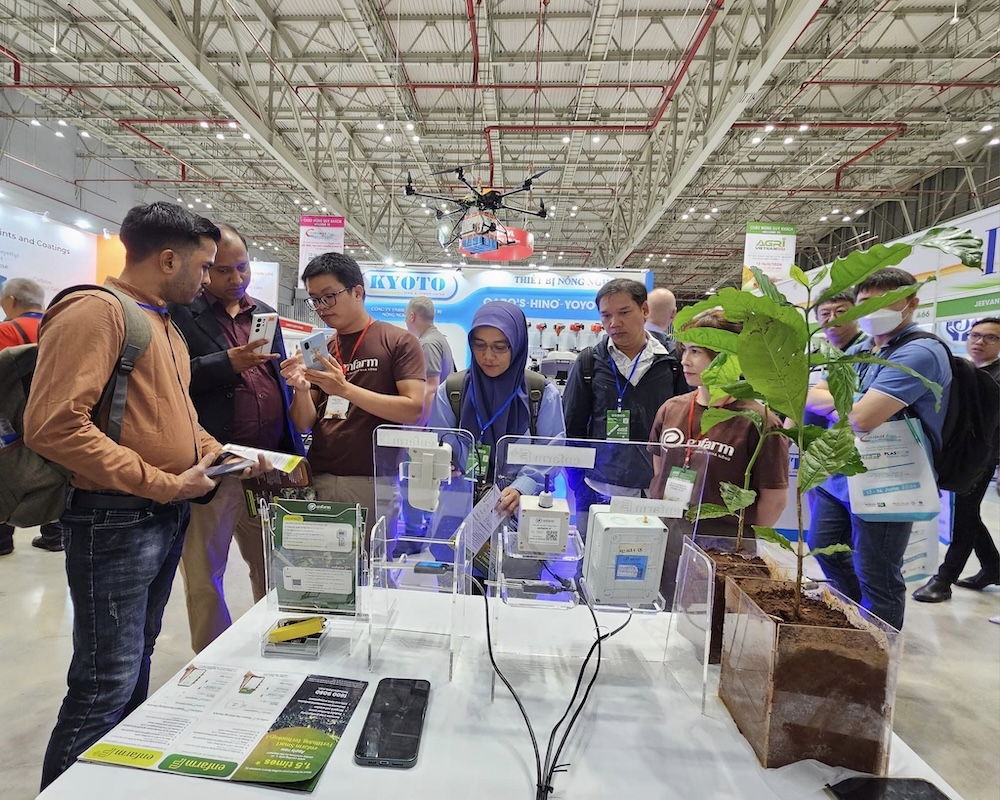Applying artificial intelligence in agriculture helps farmers reduce costs, minimize environmental impact, and enhance competitiveness amid the global green economy trend.
The Open Innovation Day 2023 event recently took place in Ho Chi Minh City with the theme “where technology meets industry.” It brought together over 100 leading experts from international organizations, universities and research institutes, executives of corporations, small and medium-sized enterprises, and both domestic and international startups.
Smart agriculture and food technology was one of the key topics that attracted startups and experts at the event.
A startup presents a solution for saving fertilizer in agriculture.
Presenting an effective solution using AI-powered smart fertilization technology to support agricultural production, Mr. Do Dung Nguyen, CEO of Enfarm Agritech — a technology startup focused on agriculture — said:
“According to estimates by the Western Highlands Agroforestry Scientific and Technical Institute, if fertilizer is applied correctly as we are doing, it can reduce fertilizer costs by 20 percent and increase crop yields by 20 percent. For coffee plants, applying the right fertilization formula can increase farmers’ income by 1.5 times.”
Mr. Nguyen Duc Tung, General Secretary of the Vietnam Digital Agriculture Association, stated:
“Roughly 60 to 70 percent of Vietnam’s agricultural startups are technology-based, and the technologies being applied are quite suitable. However, it is now crucial to incorporate modern elements, such as developing carbon-balanced products, addressing climate change, and fully integrating technological optimization into farming to reduce dependence on nature.”
According to data from the Ministry of Agriculture and Rural Development, fertilizer efficiency currently stands at just 40 percent. In other words, about 60 percent of the fertilizer applied is not absorbed by plants and instead remains in the environment. The estimated annual loss, based on current fertilizer prices, is around 60 trillion VND.
Mr. Tung also emphasized that solving current agricultural challenges, particularly those related to fertilizer, will help increase competitiveness in agricultural production. Especially as Vietnam has made strong environmental commitments, the only sustainable path forward is to pursue green and technological standards.
Applying AI in agriculture helps farmers reduce fertilizer costs and protect the environment.
Solving the fertilizer problem also contributes to reducing environmental impact. The production of nitrogen fertilizer, one of the three most important nutrients for crops, consumes large amounts of energy. Any unused nitrogen fertilizer is released into the atmosphere as nitrous oxide, a greenhouse gas that warms the planet far more rapidly than carbon dioxide.
Elaborating on Enfarm’s technological solution for measuring and saving fertilizer, Mr. Do Dung Nguyen explained:
“The core of AI in our system is data and cost savings. Once we have data on soil metrics, nutrients, moisture, and so on, the AI can recommend what to fertilize and how much. AI makes its recommendations based on input data. It also helps diagnose plant issues using scientific indicators extracted from the data, allowing farmers to save time and reduce input and labor costs.”
However, experts note that the greatest challenge facing startups applying green technology in modern farm models is cost.
Mr. Pham Hong Quat, Director General of the National Agency for Technology Entrepreneurship and Commercialization Development, shared that in order for startups to survive and pursue green agriculture models with high technological content, the Open Innovation Day program has proposed several solutions.
He said:
“Startups can optimize equipment and machinery through shared economy models, using or leasing common resources. They can also make use of underutilized infrastructure and production lines from large corporations. This creates an ecosystem that supports startups.”


